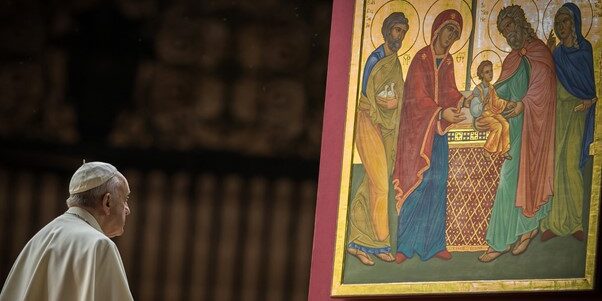PART TWO
From the Antilles Episcopal Conference
Q: What scripture passage suitably informs us about the Synod?
Prayerfully and reverently read Luke 24:13–35, which recounts the appearance of the Risen Jesus to two disciples on the road to Emmaus.
Q: What does this passage teach us about the Synod Assembly?
Like the story, the Synod assembly in Rome in October 2023 invites the participants (laity, bishops, and religious) to live the synodal experience of speaking, listening, discerning and decision-making.
Q: How does this scripture passage correlate to the synod?
We now unwrap this scriptural gift.
“Now that very day, two of them were going to a village seven miles from Jerusalem called Emmaus, and they were conversing about all the things that had occurred. . . while they were conversing and debating, Jesus himself drew near and walked with them” (Lk 24:13–15).
The two disciples represent the People of God (laity, priests, bishops and religious) who began “walking together” on October 10, 2021, and the Synodal Assembly is a significant milestone on this journey.
“…but their eyes prevented them from recognizing him” (Lk 24:16). Today, the Church experiences enormous turmoil, for example, the sex abuse scandal, ideological tensions (those for or against the Synod), and divisions such as conservative versus liberal Catholics, coupled with global and regional crises such as the Covid-19 pandemic, natural disasters, political instabilities, and climate change. These hurricane-like situations can prevent us from recognising Christ in our midst.
 “What are you discussing as you walk along?” (Lk 24:17). Then, they started sharing emotionally about what happened to Jesus of Nazareth and how it affected them.
“What are you discussing as you walk along?” (Lk 24:17). Then, they started sharing emotionally about what happened to Jesus of Nazareth and how it affected them.
The listening phase in the parishes, religious communities, the Caribbean region, and online invited us to disclose what’s on our minds. Like Luke, we captured the fruits of these experiences in syntheses – diocesan, Antilles, Continental and now a final Working Document.
“…then beginning from Moses and all the prophets, he interpreted what referred to him in all the scriptures” (Lk 24:27).
During the Synod Assembly (Rome), the participants will read and reflect on the Scripture, allowing the Holy Spirit to shed light on the concerns raised in the syntheses.
Fifth, “And it happened that, while he was with them at table, he took bread, said the blessing, broke it, and gave it to them. With that, their eyes were opened, and they recognized him….” (Lk 24:30–31).
From the time of the New Testament Church, the prayerful celebration of the Eucharist has been a climatic experience of Christ’s real presence and conversion for participants.
The Synodal Assembly, therefore, began with an Ecumenical vigil on September 30, followed by a prayerful retreat and daily celebration of the Eucharist. The Synod Assembly is fundamentally a prayerful experience, not a debating one.
Q: What low-hanging fruit is the Synod Assembly expected to bear?
“Then they said to each other, ‘Were not our heats burning within us while he spoke to us on the way and opened the scriptures to us?’ So they set out at once and returned to Jerusalem” (Lk 24:33).
The expected low-hanging fruit is the CONVERSION. Participants who arrived with inflexible ideas, opinions, and ideologies must allow this prayerful experience to change their tunnelled vision and return to their respective dioceses and recount “what had taken place on the way and how he [Risen Jesus] was made known to them in the breaking of bread” (Lk 24: 35).
Q: What’s next after the Synod Assembly?
Like Luke, who captured the experience of Jesus Christ in his Gospel, the Synod experience will be captured in a synthesis and sent to Pope Francis for his prayerful listening and discerning.
He will be guided by a fundamental question, ‘What am I hearing?’. He will then deliver his response to the participants, who will regather in October 2024 for further discernment and decision-making.
Here is a testimony about the diocesan Synod experience from the Diocese of Cayenne, French Guiana, that summarises what is hoped to occur at the Synod Assembly in Rome.
“Accepting the other in my life can be uncomfortable, but it is a way to become more human. The other takes me out of myself, it opens me to relationship[s], and God is relationship.”




